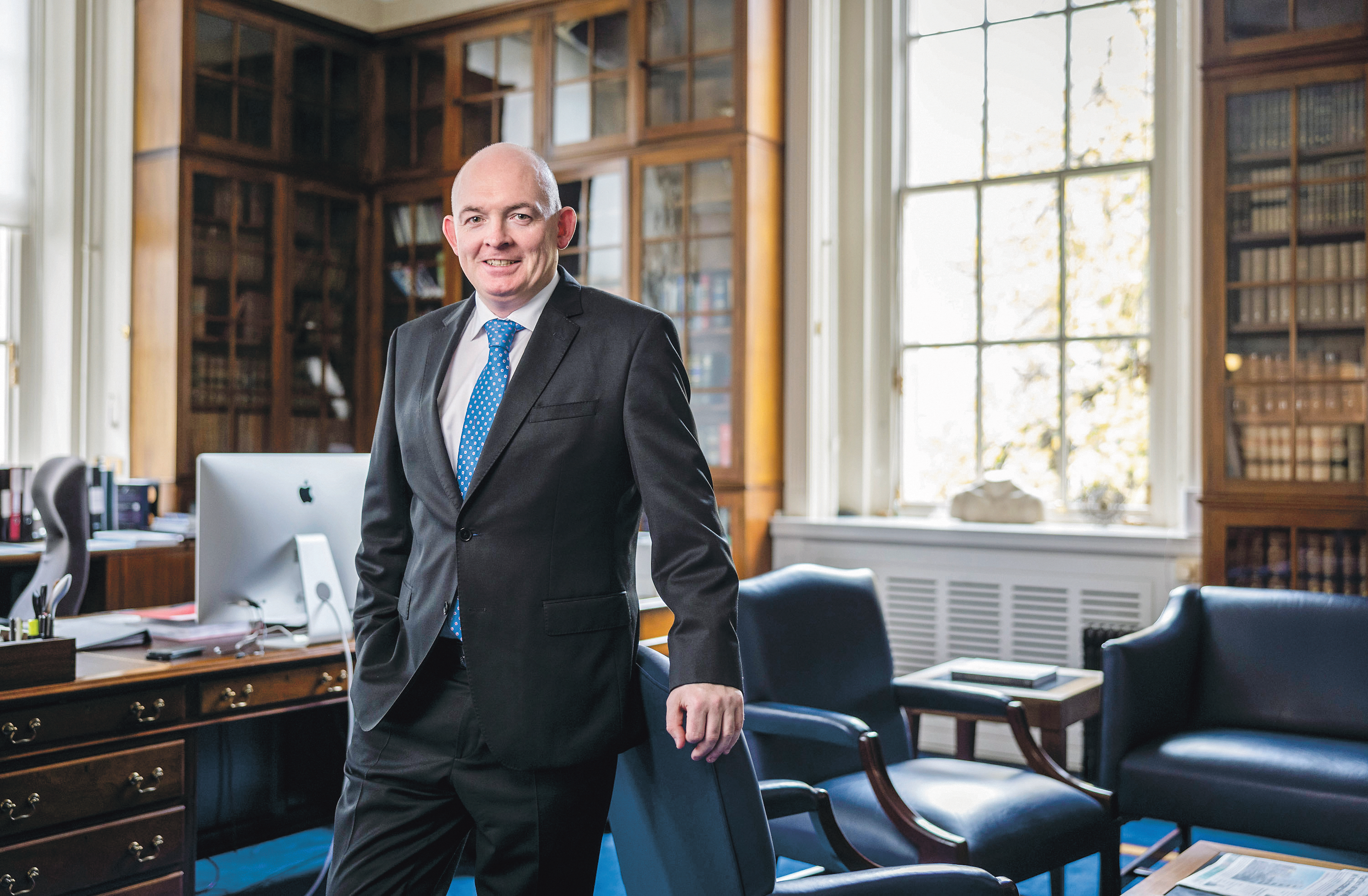
Catherine Sanz
Business Post Legal Correspondent
As the government’s chief legal adviser, Rossa Fanning, the attorney general (AG), is regularly called upon to opine on the pressing political issues of the day.
His role requires him to work, for the most part, within the strict confines of guiding ministers on the constitutionality or otherwise of proposed legislation.
In his early days, however, Fanning, a graduate of University College Dublin (UCD) and star debater, had a freer hand when wading into many of the same issues.
Press clippings from the heyday of Fanning’s 1990s student debating career show he held court on matters ranging from the economy to immigration – topics still at the heart of public life.
In a 1998 Irish Times debate on the motion entitled “This House believes that Ireland should put social justice before a tiger economy” Fanning asked why, if we all win with the Celtic Tiger, there were still areas with 70 per cent unemployment?
“There is a core group of disaffected long-term unemployed people who are outside the Celtic Tiger economy,” he said, according to a newspaper account of the evening.
On another occasion, Fanning told those in attendance that political parties were “aimed at perpetuating their own existence… and maximising their own power”.
If those opinions are hard to square with his current role – and it should be remembered that they are not necessarily views he held but rather representative of positions he was obliged to adopt as a debater – his ability to articulate them so effectively was an early indication of his precocious talent.
A list of legal powerhouses would not be complete without Fanning, but since he’s ditched private practice to advise politicians, he’s been deemed “No 101” on this list.

He doesn’t sit on the fence and will readily provide a clear view on the likely outcome, which clients appreciate. In the courtroom, he’s aggressive – he doesn’t like to lose
Career beginnings
Prior to taking a seat at the cabinet table, Fanning was one of the most in-demand senior counsels in the Law Library.
According to a solicitor who has instructed him, clients love Fanning because he “keeps an eye on the commercials and engages with them on this basis”. He also said that the barrister’s enthusiasm is “infectious”.
“He doesn’t sit on the fence and will readily provide a clear view on the likely outcome, which clients appreciate. In the courtroom, he’s aggressive – he doesn’t like to lose,” he added.
Another solicitor made similar remarks. “He’s very approachable and responsive and always prepared to take on difficult contentious work across a range of commercial areas,” he said.
Born in 1976 and raised in Leopardstown, Fanning attended Blackrock College before studying law, and subsequently earning a master’s degree, at UCD.
He studied at the University of Michigan Law School as a scholar of the Fulbright Program and subsequently attended the King’s Inns, and was the individual winner of the Irish Times Debate while studying there. He was called to the Bar in 1999 and took silk in 2016.
It was his role in the Moriarty Tribunal, where he represented former communications minister Michael Lowry, that first brought him to national prominence.
While the other legal eagles typically used a back door entrance out of view of the waiting press cameras at Dublin Castle to avoid publicity, Fanning was said to have “strode” across the yard on his first day in the job, unphased by the glare of the nation’s media and undaunted by the work at hand.
A commercial litigation specialist, Fanning has been involved in cases involving heavyweights of Irish business life including Dermot Desmond, Michael Smurfit, Denis O’Brien and Larry Goodman.
Fanning’s tendency to land a great line when on his feet in court made him popular with the media, who knew that his appearance in a case meant it was likely to be more interesting than most.
In 2021, while acting for Fórsa, the trade union representing pilots, Fanning had a pop off Michael O’Leary, telling the court that solicitors for the Ryanair chief executive said he “doesn’t do email”.
“I just have to say Mr. O’Leary must find life very difficult to manage without an e-mail account because I can’t register for anything online without one myself,” Fanning said.
Self-aware
Along with law, the other great love of his life is tennis, a subject he has previously written about for the Business Post. He was chair of the selection committee for the Irish Davis Cup tennis team and can often be found at the Fitzwilliam Lawn Tennis Club.
Fanning has become a sought-after keynote speaker for legal events, both for the prestige of landing the AG as a guest and for his ability to entertain.
A life-long straight talker, he has a good sense of humour and has no problem mocking himself, his job, or the upper echelons of the legal world.
When commenting last year on being made a “bencher” of the King’s Inn, an inner circle which acts as the governing body of the organisation, Fanning remarked on his delight at joining “a self-perpetuating oligarchy”.
And in front of a room full of journalists at the Leinster House table quiz he previously joked about his role as quizmaster being like his day job in taking the blame for things that go wrong despite him not having designed them.
While his way with words has undoubtedly bolstered him professionally, it can also lead to him being cutting in person, according to people who know him. But even those who offer up criticisms of Fanning, such as that he has a healthy ego, acknowledge that he’s not thin-skinned.
“He can take it as well as he can give it, and he can give it better than some,” a legal colleague said.
He is also highly respected by his former devils, or legal apprentices, who were all among the brightest of their class and have gone on to have successful practices themselves.
Fanning is not from a legal family and has always ensured a meritocracy endures when he’s around. For example, none of the 11 devils (six men and five women) he took on during his years as a junior counsel were the sons or daughters of judges or senior counsel.
Among the changes he’s instituted as AG is to ensure applicants to his office’s panel of counsel can submit samples of legal writing and other work demonstrative of their skill. This was designed to help ensure less well-connected lawyers had a better chance of proving their talent.
In the early 1990s, a teenage Fanning was so eager to learn about what was quickly developing into a lifelong passion that he was said to have occasionally dropped in on law lectures at University College Dublin.
Having risen to the highest echelons of public life in his role as AG, Fanning’s early curiosity allied with a searing intellect and withering tongue has served him in good stead as he’s commanded a permanent position at the intersection of Irish business, legal and political life in the decades since.
Home>
